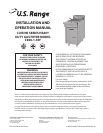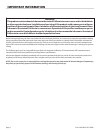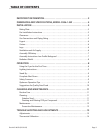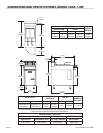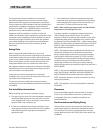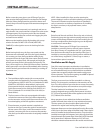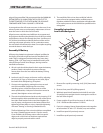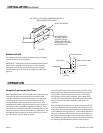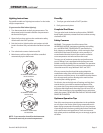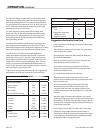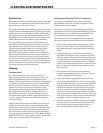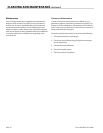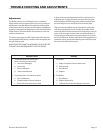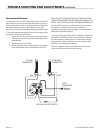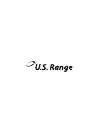
Part # 4518632 (02/19/08) Page 5
INSTALLATION
The importance of proper installation of commercial
gas cooking equipment cannot be over stressed. Proper
performance of the equipment is dependent, in great part,
on the compliance of the installation with the manufacturer’s
specications. In addition, compliance with the National
Fuel Gas code ANSI Z 223.1-1988/NFPA and/or Local code is
required to assure safe and ecient operation.
Appliances shall be installed in a location in which the
facilities for ventilation permit satisfactory combustion of gas
and proper venting. Appliances shall be located so as not to
interfere with proper circulation of air within the conned
space. When buildings are so tight that normal inltration
does not provide the necessary air, outside air shall be
introduced.
Rating Plate
When corresponding with the factory or your local
authorized factory service center regarding service problems
or replacement parts, be sure to refer to the particular unit
by the correct model number (including the prex and sux
letters and numbers) and the warranty serial number. The
rating plate axed to the unit contains this information.
We suggest installation, maintenance and repairs should be
performed by your local authorized service agency listed in
your information manual pamphlet.
In the event you have any questions concerning the
installation, use, care or service of the product, write or call
our Product Service Department.
This product has been certied as commercial cooking
equipment and must be installed by professional personnel
as specied.
Pre-Installation Instructions
Before assembly and connection check gas supply.
A. The type of gas for which the unit is equipped is stamped
on the data plate located on inner door panel. Connect
a unit stamped “NAT” only to natural gas; connect those
stamped “PRO” only to propane gas.
B. If it is a new installation have the gas authorities check
meter size and piping to assure that the unit is supplied
with sucient amount of gas pressure required to
operate the UNIT.
C. If it is additional or replacement equipment have gas
authorities check pressure to make certain that existing
meter and piping will supply fuel to the unit with not
more than 1/2” water column pressure drop.
NOTE: When checking gas pressure be sure that all other
equipment on the same gas line is on.
A pressure regulator is supplied as standard equipment
with US Range Heavy Duty Gas Fryers. The pressure
regulator is “built-in” to the fryer, (the regulator is part of the
combination safety valve). Installation must conform with
the National Fuel Gas code ANSI Z223.1-1988 or latest edition
NFPA No. 54-Latest Edition and National Electrical code ANSI/
NFPA 70-1990 or latest edition and/or local code to assure
safe and ecient operation.
NOTE: The appliance and its individual shut-o valve (not
supplied by manufacturer) must be disconnected from
the gas supply piping system during any pressure testing
of that system at pressures in excess of ½ PSIG (3.45 KP2).
The appliance must be isolated from the gas supply piping
system by closing its individual manual shut-o (not
supplied by manufacturer) during any testing of the gas
supply piping system at test pressures equal to or less than ½
PSIG (3.45KP2).
NOTE: In Canada, the installation shall be in accordance
with CAN/CGA-B149.1 NATURAL GAS AND PROPANE GAS
INSTALLATION CODE and local codes where applicable.
NOTE: Adequate clearance must be provided for servicing
and proper operation.
NOTE: This appliance is not recommended for residential
installation.
Clearances
From Combustible material 6” sides and rear. A clearance
of 0.0” to non combustible construction as sides & rear
is acceptable. The fryer is suitable for installation on
combustible oor.
Gas Connections and Piping Sizing
The size of the gas line is very important. If the line is too
small, the gas pressure at the burner manifold will be low.
This will cause slow recovery, delayed ignition, and pilot
outage. Refer to the Gas Line Sizing Chart in the nation Fuel
Codebook.



